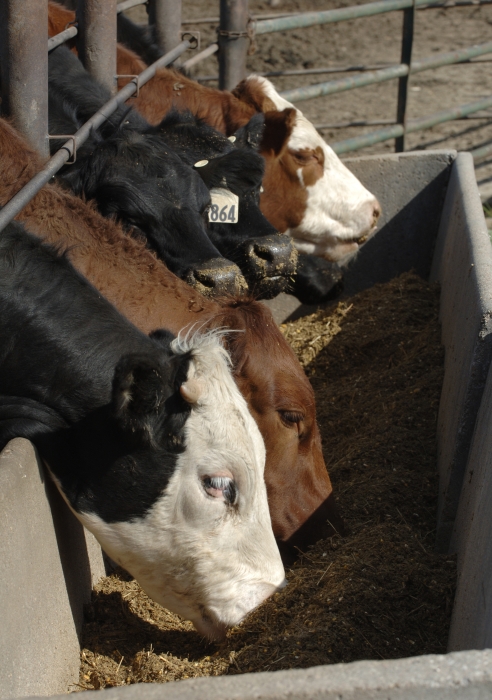
By Matt Luebbe and Galen Erickson, UNL Feedlot Extension
Many ethanol plants are beginning to remove a portion of the corn oil from distillers solubles, or the liquid syrup fraction, and market the oil for biodiesel or feeding to other livestock. The most common method to remove oil in Nebraska is this new process of centrifugation of the thin stillage. Historically, distillers grains plus solubles have about 11-13% fat and this contributes to the improvement in feeding value relative to corn. Using this new process reduces the oil to approximately 7 to 8% of distillers grains plus solubles. Based on more than 20 experiments, wet distillers grains with solubles has approximately 130-135% the feeding value relative to corn. Drying distillers grains partially to make modified distillers grains plus solubles results in a feeding value of approximately 125% of corn and completely drying to 10% moisture to make dry distillers grains plus solubles decreases the value to about 110% of corn.
Corn oil is energy dense and generally has 3 times more energy than starch. All plants produce whole stillage which is centrifuged into the wet grains and thin stillage. The thin stillage is condensed to make distillers solubles and then combined to the wet grains to produce wet, modified, or dry distillers grains. The new process includes an additional step where the thin stillage is centrifuged to remove the unbound or “free” oil. Typically, of the 12% fat or oil that is in distillers grains plus solubles, the solubles portion contains 1/3 of that oil while the wet grains have 2/3. When the de-oiled solubles are combined with the grains, the resulting distillers grains with solubles product has approximately 4 percentage units less oil than the normal distillers. This process is relatively new and we are still learning about what the implications of oil removal will be. Ethanol plants are looking into other fractionation methods which will change the nutrient composition and feeding value of the by-products. For example, a more intense fractionation method used by some ethanol plants removes the germ part of the kernel and an even greater amount of the oil. Research suggests the resulting by-product has the same feeding value as corn when the corn germ is removed. Again, the centrifugation method is different and is the most common approach being used in Nebraska today.
Research using de-oiled distillers grains with solubles in finishing diets shows a small reduction in feed efficiency from 0 to 1.5%. However, in these experiments, no significant change in performance was observed. In one study with modified distillers grains fed at 40% or distillers solubles fed at 27%, there was no significant or numerical difference in feedlot performance (2013 Nebraska Beef Report, pp. 64-65 http://go.unl.edu/t76). More recent work evaluated feeding 35, 50, or 65% inclusion of wet distillers grains plus solubles with or without the oil extracted. Again, no significant difference was observed, but a 4% decrease in the fat content of distillers did decrease the feeding value by 6% for the distillers grains plus solubles. Again though, this was not significant. In all cases, the feeding value of these distillers grains is still greater than corn. When feeding wet distillers grains the feeding value may decrease from 130% of corn to 124% but this small difference is difficult to measure in one study. Additional research is underway to build a database that compares the traditional distillers grains compared with the de-oiled product.
In forage based diets the removal of the oil may not have a large negative effect, based on the research data collected so far. Feeding higher levels of fat in forage diets can reduce fiber digestibility and feed efficiency. The de-oiled distillers grains may have an advantage in forage diets when fed at higher levels compared with the normal (11-13% fat) distillers grains. Similar to the feedlot research, there are trials underway to determine what extent oil removal has in forage based diets.
More Details at:
Effects of Feeding Condensed Distillers Solubles With and Without Oil Extraction on Growing Cattle Performance http://go.unl.edu/hai
For more UNL Beef information go to http://beef.unl.edu